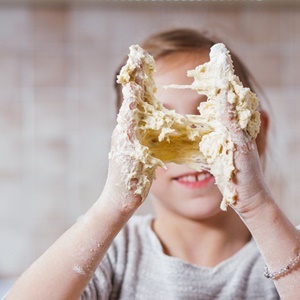
In order to lower the risk of coeliac disease, the best time to introduce gluten to a breast feeding infant's diet may be between the ages of four and six months, according to a new systematic review of published reports.
This conclusion matches the advice given by the European Society of Pediatric Gastroenterology, Hepatology and Nutrition's Committee on Nutrition. But the authors of the review say the evidence is weak, and the data that support introducing gluten after age four months and before age seven months are only from breast-fed babies.
Dr Hania Szajewska from The Medical University of Warsaw, Poland and colleagues are conducting the PREVENTCD study, to investigate whether it is possible to induce tolerance to gluten in genetically predisposed children through the introduction of small quantities of gluten during the period of breast feeding, in hopes of thereby preventing coeliac disease. Results from PREVENTCD will not be available until after 2013.
In the meantime, they undertook the systematic review that was published online in the Alimentary Pharmacology and Therapeutics, to summarise what's known about possible links between early feeding practises and the risk of coeliac disease auto-immunity.
Still remaining uncertainties
The studies reviewed left open the question of whether breast feeding prevents coeliac disease. One systematic review showed no clear relationship, two studies showed conflicting results, and 11 studies showed that short-term breast feeding did not appear to increase the risk of coeliac disease.
Breast feeding at the time of introduction of gluten, however, appeared to cut the risk of later coeliac disease by about half.
The relationship between timing of gluten introduction and coeliac disease is equally unclear, as various studies used different cut-offs in their analysis of the timing. For example, one study showed that introduction of gluten after four months of age reduced the risk by about a third, whereas another study showed an increased risk when gluten was introduced after seven months (compared with a four-to-six months window). Most other studies showed no relationship between timing and coeliac disease risk.
In the only study addressing the amount of gluten, the risk of developing coeliac disease was greater when gluten was introduced before age two in large amounts vs small or medium amounts. This effect did not apply to older children.
With these tenuous findings, Dr Szajewska concluded, "In my opinion, evidence available allows to support the recommendation made by the ESPGHAN Committee on Nutrition that both early (<4 months) and late (7 or more months) introduction of gluten should be avoided and that gluten be introduced into the diet when the infant is still being breast-fed."
In addition to the PREVENTCD study, several other trials are underway now to look for links between coeliac disease and the timing of gluten exposure in at-risk infants: one in the U.S. that's currently recruiting subjects (ClinicalTrials.gov Identifier: NCT00819819), plus one in Italy (NCT00639444) and another in Finland (NCT00617838).
"Future studies may clarify the remaining uncertainties," Dr Szajewska said.
Noting the dietary restrictions patients are faced with "lifelong no bread, no pasta, etc.," she added, "Any measures to decrease the risk of developing coeliac disease would be welcomed!"
(Reuters Health, October 2012)
Read More:




 Publications
Publications
 Partners
Partners











